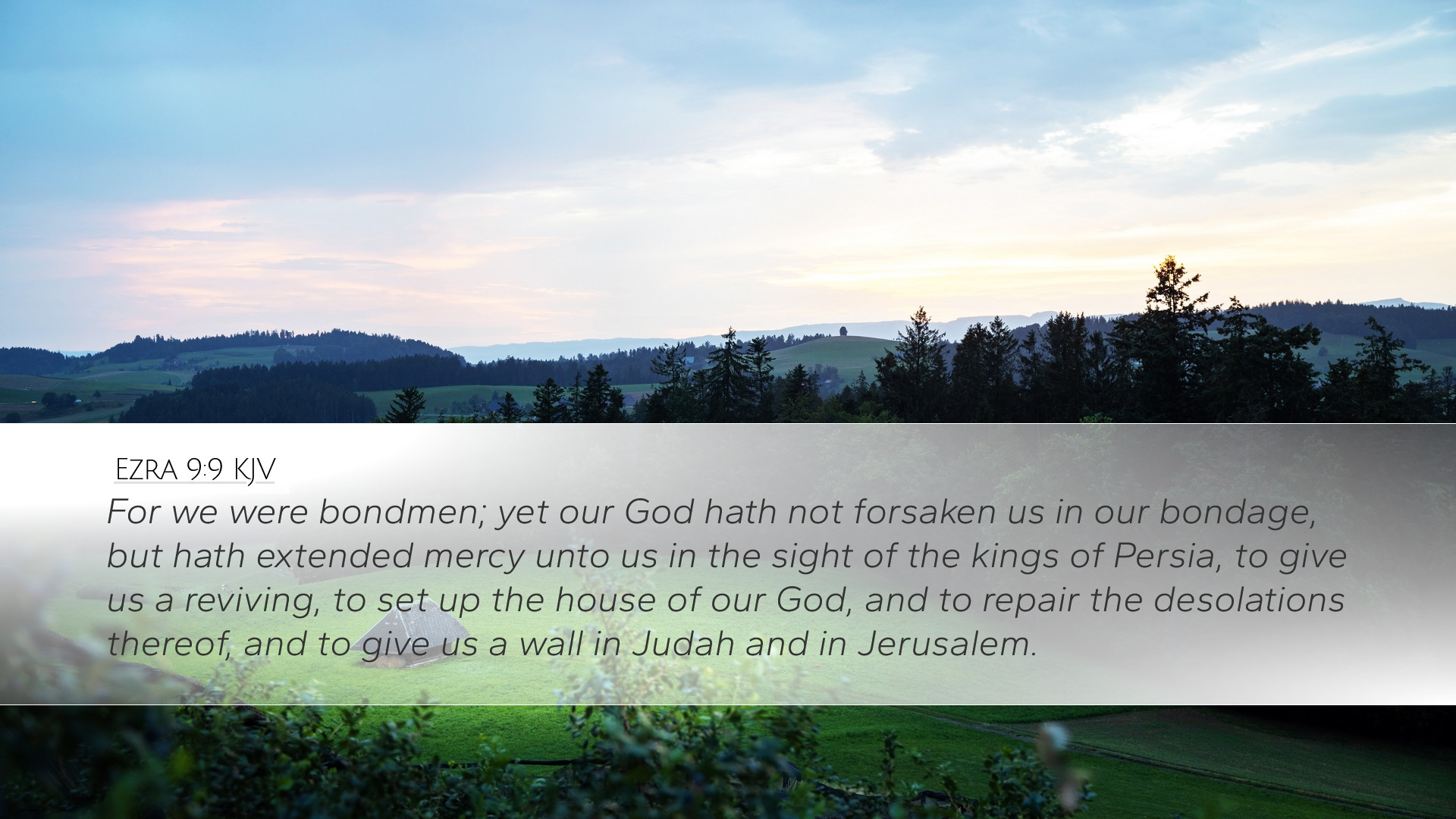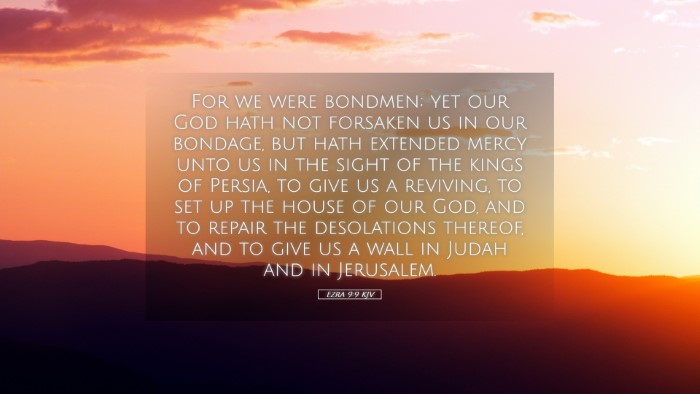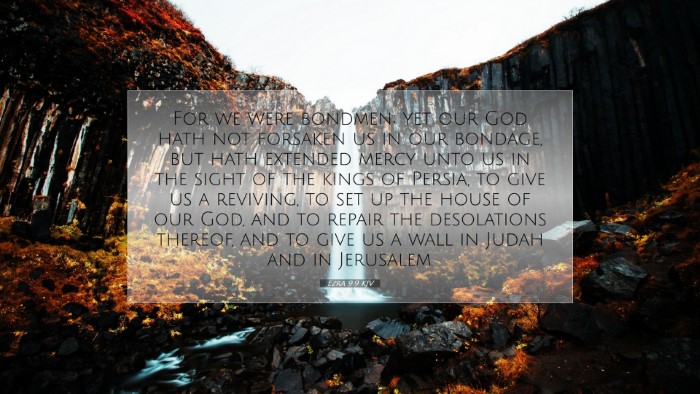Old Testament
Genesis Exodus Leviticus Numbers Deuteronomy Joshua Judges Ruth 1 Samuel 2 Samuel 1 Kings 2 Kings 1 Chronicles 2 Chronicles Ezra Nehemiah Esther Job Psalms Proverbs Ecclesiastes Song of Solomon Isaiah Jeremiah Lamentations Ezekiel Daniel Hosea Joel Amos Obadiah Jonah Micah Nahum Habakkuk Zephaniah Haggai Zechariah MalachiEzra 9:9
Ezra 9:9 KJV
For we were bondmen; yet our God hath not forsaken us in our bondage, but hath extended mercy unto us in the sight of the kings of Persia, to give us a reviving, to set up the house of our God, and to repair the desolations thereof, and to give us a wall in Judah and in Jerusalem.
Ezra 9:9 Bible Commentary
Ezra 9:9 - Commentary Summary
Verse Context: Ezra 9:9 states, "For we were slaves; yet our God did not forsake us in our bondage, but He extended mercy to us in the sight of the kings of Persia, to revive us, to repair the house of our God, and to restore its ruins, and to give us a wall in Judah and Jerusalem." This verse encapsulates a moment of recognition and gratitude for God's mercy amidst adversity.
Exegesis of Ezra 9:9
The book of Ezra focuses on the return of the exiles to Jerusalem and the rebuilding of the temple. Chapter 9 addresses the confession of Ezra upon learning about the intermarriage between the Israelites and foreign nations, which compromised their covenant with God. This verse specifically highlights the historical context of their captivity and the response of God towards His people during these trying times.
Matthew Henry's Commentary
Matthew Henry elaborates on the themes of divine mercy and providence present in Ezra 9:9. He notes:
- God’s Faithfulness: Despite the people’s unfaithfulness and sins, God did not abandon them but instead showed His enduring mercy. This highlights God's promise to His people, reminding them of His commitment even in their unworthiness.
- The Role of Persians: God's use of the kings of Persia signifies His control over great empires and rulers to facilitate His plans. The kindness shown by these kings serves as an example of God's sovereign orchestration for the benefit of His chosen people.
- Restoration and Revival: Henry emphasizes that God's mercy leads to revival, both spiritually and physically, as He repairs the ruined places in the lives of His people and restores their status within the promised land, illustrating the idea of renewal after repentance.
Albert Barnes' Commentary
Albert Barnes reinforces the notion of divine intervention and the concept of servitude in Ezra 9:9:
- Recognition of Bondage: The acknowledgment of their status as slaves signifies a deep understanding of their situation. This humility is crucial in recognizing the need for God’s mercy and forgiveness.
- The Extent of God’s Mercy: Barnes points out that God’s mercy is not only the cessation of punishment but includes active blessings, such as empowering the exiles, providing materials for rebuilding, and reinstating their identity as God’s people.
- The Implication for Worship: The revival and repair of the temple are not just physical and societal restoration but also a return to true worship. God’s mercy beckons a recommitment to His covenant, emphasizing the connection between repentance, worship, and restoration.
Adam Clarke's Commentary
Adam Clarke examines the theological implications of God's actions in this verse:
- Understanding Exile: Clarke suggests that exile was a form of discipline. The acknowledgment of their prior condition establishes a foundation for their current gratitude and dependence on God.
- Divine Providence: The 'mercy' granted to the exiles serves as a testament to God's providential care. Clarke emphasizes that this mercy was given to the Israelites through the favor shown to them by their captors, underscoring God's intricate planning in the lives of those who seek Him.
- Restoration as Promise: Clarke links the restoration mentioned in the verse to the prophetic promises of God regarding the return of His people and the rebuilding of the temple. This fulfills the long-standing promise of restoration to His faithful remnant.
Theological Themes
This passage offers profound insights valuable for pastors, students, and scholars alike:
- God's Mercy in Affliction: The acknowledgment that God did not forsake them in their bondage is a core theme of comfort for believers facing trials. This serves as a reminder that affliction can often be part of God's plan for spiritual growth and dependence on Him.
- Remnant Theology: The idea of a faithful remnant is pivotal in biblical theology. Ezra 9:9 embodies the concept that even in the depths of sin and exile, a faithful group remains, and God’s mercy can restore them to their rightful place.
- Historical Continuity of God’s Plan: The mention of the kings of Persia emphasizes that God’s overarching narrative spans history and geography. This acknowledgment challenges believers to see their place in God's unfolding narrative and His sovereign purpose.
Conclusion
Ezra 9:9 serves as a powerful reminder of God's unwavering mercy and faithfulness in the face of human failure. It invites the faithful to reflect on their lives, appreciate God's lovingkindness, and commit to the restoration of their spiritual lives and communal worship. This verse encapsulates the hope found in recognizing our humble state and the transformative nature of God's grace.


